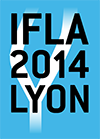
80th IFLA General Conference and Assembly
16-22 August 2014, Lyon, France
17 August 2014
IFLA's Professional Activities
Deutsch | Español | français | Русский | 简体中文 | العربية
What makes an IFLA section successful?
Who doesn't want success? This was the driving message of Session 67 B at the IFLA Market, as articulated by Russell S. Lynch, Chair of IFLA Division II (Library collections), along with IFLA Governing Board member Genevieve Clavel-Merrin, who also raised awareness of the need for collaborative projects between different Sections and Divisions.
The session started with recap of IFLA’s strategic priorities and Key initiatives; all IFLA supported projects must use them in part as a guide to structuring proposals. Successful past projects have proved that IFLA was willing to help and support a wide range of interests. One example is an international survey among different librarians training all over the world; results should soon be available in the IFLA Library.
Participant led discussions
Delegates were also invited to participate in roundtable discussions. The rules were to speak with more than two people and talk with people belonging to IFLA Divisions other than their own. I had the opportunity to listen to some interesting conversations from different sections.
Of course the first obstacle in getting projects going is everyone’s perpetual lack of time. IFLA members are often more than willing to get involved with intense work, but can't find enough time in busy schedules to start new projects. But another aspect of the discussion was more efficient, because it was about the misunderstanding by the participants of the internal organisation of IFLA. A newcomer around the table showed IFLA’s clear organizational diagram (an organigram) given during the Newcomer Session earlier in the morning; everyone agreed that this drawing would be useful to help better understand IFLA’s internal organisation.
In order to improve your knowledge of IFLA’s overall functioning, be sure to visit the Officers Corner, where you can find, for example, a clear breakdown of IFLA’s professional structure.
Last update: 18 August 2014


